Sumo wrestling, a centuries-old Japanese tradition, comes alive each morning at the Yokozuna Stable in Ryogoku. As the sun rises, spectators gather to witness the intense training of these elite athletes. The rikishi, or wrestlers, demonstrate their strength, skill, and discipline through a series of warm-ups, technique drills, and sparring matches. This intimate experience not only offers a rare glimpse into the daily lives of these remarkable individuals but also immerses visitors in the rich cultural heritage of this beloved sport.
Key Points
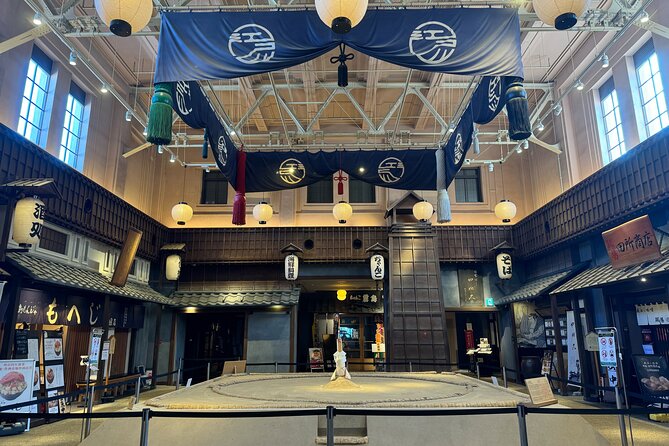
- Visitors can witness the morning training of sumo wrestlers at the historic Yokozuna Stable near Ryogoku Station, offering a rare glimpse into Japan’s national sport.
- Sumo traditions and rituals, such as salt throwing and bowing to the dohyo, are an integral part of the wrestlers’ daily practice and culture.
- The intense training regimen of sumo wrestlers, including specialized techniques, strict dietary guidelines, and mental preparation, exemplifies the discipline of this ancient sport.
- The Ryogoku neighborhood, home to the Ryogoku Kokugikan sumo arena and sumo-themed shops and museums, provides an immersive experience in Japan’s sumo traditions.
- Observing the powerful displays of strength, skill, and discipline during the morning practice sessions at the Yokozuna Stable offers a captivating exploration of sumo’s enduring legacy.
Discovering the Yokozuna Stable
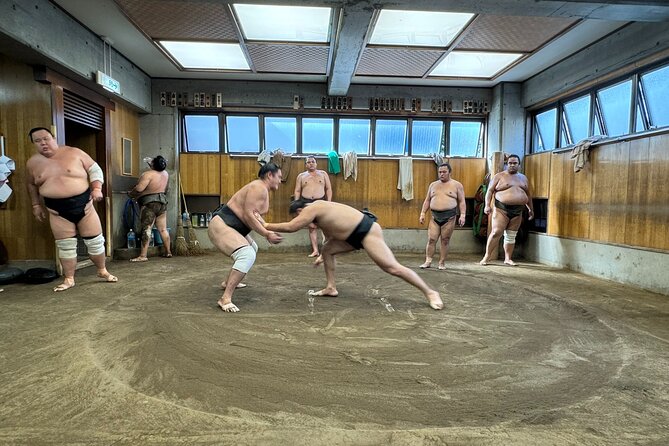
As visitors make their way to the RYŌGOKU STATION in Tokyo, they’ll find themselves on the doorstep of the Yokozuna Stable, a hallowed ground where the sport of sumo wrestling is practiced with unwavering dedication.
This historic venue offers a rare opportunity to witness the morning training of sumo wrestlers, known as rikishi, as they prepare for their intense bouts.
Stepping inside, guests are transported to a world where centuries-old traditions and rituals are upheld, providing a unique glimpse into the heart of Japan’s national sport.
The experience promises to be a captivating and immersive exploration of sumo’s enduring legacy.
Here are more great tours and experiences we've reviewed in Tokyo
Sumo Traditions and Rituals
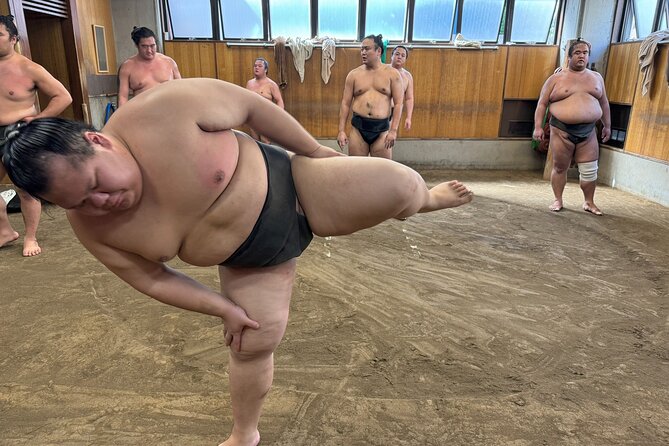
The sumo stable’s morning practice is steeped in centuries-old traditions and rituals that shape the sport’s unique culture. From the ceremonial salt-throwing to the strict hierarchy, every aspect of the practice reflects the deep-rooted values of the sumo world.
| Tradition | Description |
|---|---|
| Salt Throwing | Purifies the ring and wards off evil spirits. |
| Kensho | Bowing to the dohyo (ring) to show respect. |
| Shikona | Wrestlers are known by their unique ring names. |
| Hierarchy | Strict ranking system determines roles and privileges. |
These traditions are the heartbeat of sumo, woven into the fabric of the sport’s daily practice and performance.
Witnessing the Morning Practice
How does one witness the captivating morning practice at a renowned sumo stable in Ryogoku?
Visitors arrive at the Ryogoku station, eager to catch a glimpse of the sumo wrestlers. They make their way to the stable, where they’re greeted by the stable staff.
Inside, the wrestlers engage in intense training, adhering to centuries-old traditions. Visitors observe the powerful displays of strength, skill, and discipline.
They witness the wrestlers performing their warm-up exercises, practicing techniques, and engaging in sparring matches. The atmosphere is electric, as the wrestlers push their limits and strive for perfection.
This intimate experience offers a rare window into the world of sumo.
The Discipline of Sumo Wrestling
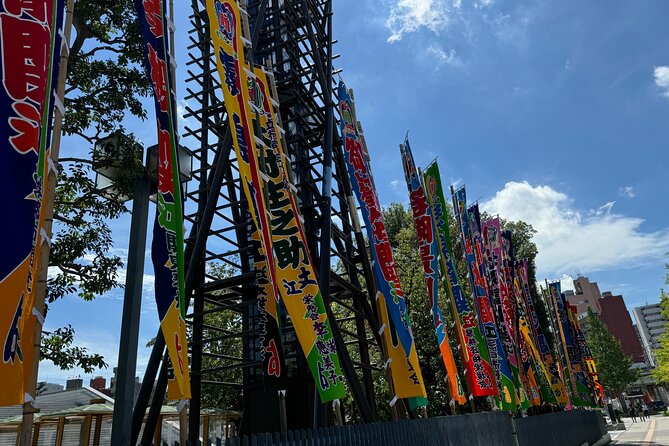
Though steeped in centuries-old traditions, the discipline of sumo wrestling demands an unwavering commitment from its practitioners.
Sumo wrestlers, known as rikishi, adhere to a rigorous training regimen that includes specialized techniques, strict dietary guidelines, and intense physical conditioning. Their days begin before dawn with hours of practice, followed by meticulous grooming rituals and mental preparation.
This uncompromising dedication extends beyond the stable, as rikishi are expected to embody the sport’s core values of respect, integrity, and honor both on and off the dohyō, or sumo ring.
The discipline of sumo permeates every aspect of a wrestler’s life.
Exploring the Ryogoku Neighborhood
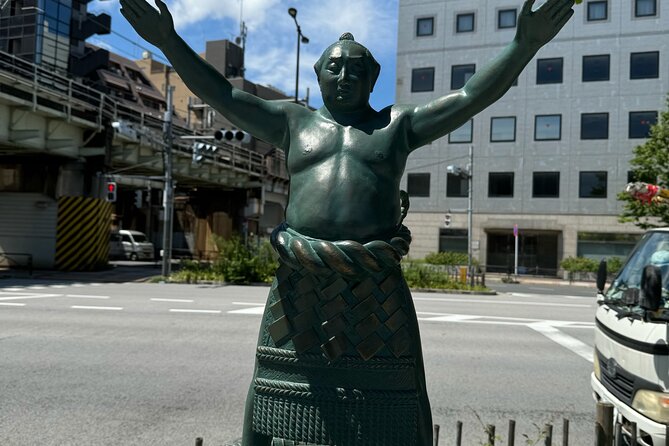
Beyond the unwavering discipline of sumo wrestling, the Ryogoku neighborhood in Tokyo offers a captivating glimpse into the sport’s vibrant cultural heritage.
This historic district is home to the Ryogoku Kokugikan, the premier sumo wrestling arena, where the grand tournaments are held.
Strolling through the area, visitors encounter a myriad of sumo-themed shops, restaurants, and museums, each offering a deeper understanding of this ancient Japanese tradition.
From the imposing Edo-era architecture to the bustling atmosphere, Ryogoku embodies the spirit of sumo, inviting travelers to enjoy its timeless traditions.
- English Driver 1-Way Haneda Airport To/From Tokyo 23 Wards
- From Tokyo: Private Sightseeing Tour to Mount Fuji & Hakone
- Mount Fuji Full Day Private Tour (English Speaking Driver)
- Tokyo: Full Day Private Walking Tour With a Guide
- Mt Fuji & Hakone: Sightseeing Private Day Tour With Guide
- Tokyo City Customized Tour With English Speaking Guide
Savoring the Sumo-Themed Lunch
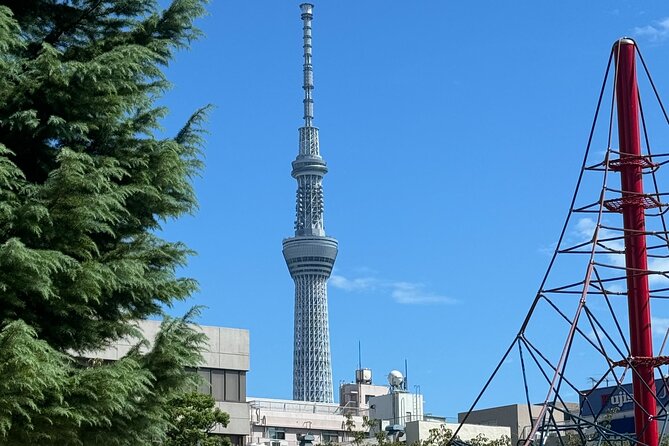
After the exhilarating experience of witnessing the Yokozuna Stable Morning Practice, participants savor a delectable sumo-themed lunch.
The meal is served in a cozy, traditional restaurant near the sumo stable. Guests indulge in a variety of Japanese dishes, including hearty chanko nabe, a nutritious stew commonly eaten by sumo wrestlers.
The flavorful broth, filled with an abundance of protein-rich ingredients, provides a satisfying and energizing post-practice refuel. Complementing the main course are side dishes that incorporate sumo-related motifs, adding to the authenticity of the culinary experience.
The lunch allows travelers to fully enjoy the world of sumo.
The Sumo Museum Experience
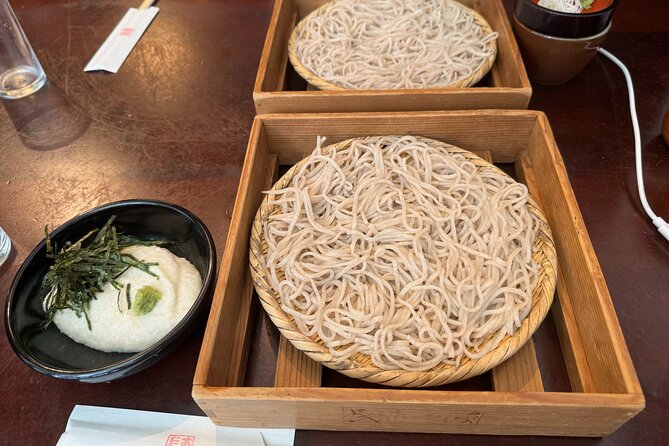
Following the hearty sumo-themed lunch, travelers make their way to the nearby Sumo Museum.
They’re greeted by the museum’s impressive collection of sumo-related artifacts, including historical photographs, costumes, and trophies.
Visitors can learn about the rich history and tradition of this ancient sport, exploring its cultural significance in Japan.
The museum admission fee is included in the tour package, providing an enriching supplement to the morning’s sumo practice experience.
With informative displays and interactive exhibits, the Sumo Museum offers a deeper appreciation for the world of professional sumo wrestling.
Reflecting on the Sumo Spirit
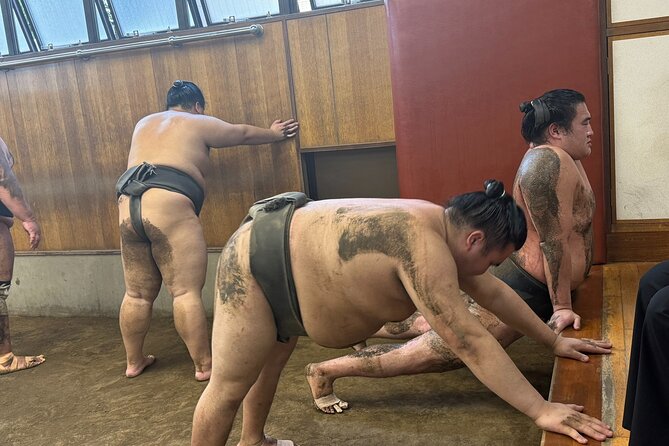
As travelers leave the Sumo Museum, they can’t help but feel a newfound appreciation for the sport’s rich culture and traditions.
The morning practice at the Yokozuna Stable embodies the essence of the sumo spirit. Witnessing the discipline, dedication, and respect displayed by the wrestlers is a humbling experience.
Visitors observe the meticulous training regimen, the deep bows, and the camaraderie among the stable members. This intimate glimpse into the sumo world reinforces the sport’s timeless values of honor, tradition, and community.
Travelers depart with a deeper understanding of the profound significance of sumo in Japanese society.
Frequently Asked Questions
What Is the Minimum Age Requirement for Participating?
The experience does not specify a minimum age requirement. However, participants must be able to climb stairs and stand for extended periods of time to fully enjoy the morning sumo practice session.
Can I Bring a Camera to Take Photos During the Practice?
Participants are allowed to bring cameras and take photos during the Yokozuna Stable Morning Practice in Ryogoku. However, they should be respectful of the sumo wrestlers and the stable environment, and avoid disrupting the practice.
Is There an Option to Purchase Souvenirs or Merchandise?
Yes, there are opportunities to purchase souvenirs and merchandise during the experience. Travelers can find small gifts from the sumo stable and other items for sale at the on-site museum that’s included in the tour.
Can I Interact With the Sumo Wrestlers During the Practice?
Travelers can’t directly interact with the sumo wrestlers during the practice session, but they’ll have the opportunity to observe the intense training and rituals up close. Interaction is limited to observing and taking photos from a designated viewing area.
Is There a Dress Code or Recommended Attire for the Experience?
There’s no strict dress code, but visitors should wear comfortable, modest clothing. Closed-toe shoes are recommended. Avoiding shorts, tank tops, or revealing outfits is advised to respect the traditional sumo culture during the morning practice.
The Sum Up
Witnessing the intense morning practice at the Yokozuna Stable in Ryogoku immerses visitors in the rich traditions and values of sumo, offering a rare glimpse into the daily lives of these athletes. This experience showcases the discipline, strength, and skill of rikishi, reflecting Japan’s enduring cultural legacy and the spirit that defines this revered sport.
More Morning in Tokyo
- Morning Market Adventure: Toyosu & Tsukiji With Tuna Auction
- Sumo Morning Practice & Japanese Brunch Experience
- Tokyo Morning Half Day City Tour With Hotel Pick-Up by Gray Line
- Private Sunrise Run: Explore Imperial Palace in Exclusive Style
- Tokyo Morning Shuffle Dance and Breakfast Experience
- Tokyo 5hr Private Tour & Sumo Wrestler Morning Practice Viewing
More Tour Reviews in Tokyo
- Tokyo: Shinobi Samurai Premium EXP for Solo Travelers, 90min
- Mt Fuji Private Tour With English Speaking Driver
- Nerikiri Wagashi-Making With Tea Ceremony Review
- Tokyo 3-Hour Guided E-bike Cycling Tour of the Citys Hidden Gems
- Official Street Go-Kart Tour – Shinagawa Shop
- 【Open 1st Anniv.】Popular Sushi Making Class Near Tokyo Tower
Not for you? Here's more things to do in Tokyo we have recnetly reviewed
- 2 Best Craft Beer Tours And Tastings In Tokyo
- 20 Best 2 Day Tours In Tokyo
- 7 Best 3 Day Tours In Tokyo
- 6 Best 4 Day Tours In Tokyo
- 25 Best Cruises And Boat Tours In Tokyo
- 25 Best Food Tours In Tokyo
- 20 Best Full-Day Tours In Tokyo
- 15 Best Helicopter Flights And Tours In Tokyo
- 2 Best BBQ Experiences In Tokyo
- 5 Best Coffee Tours And Tastings In Tokyo
- 25 Best Lunch Experiences In Tokyo
- 12 Best Massage And Relaxation Services In Tokyo
